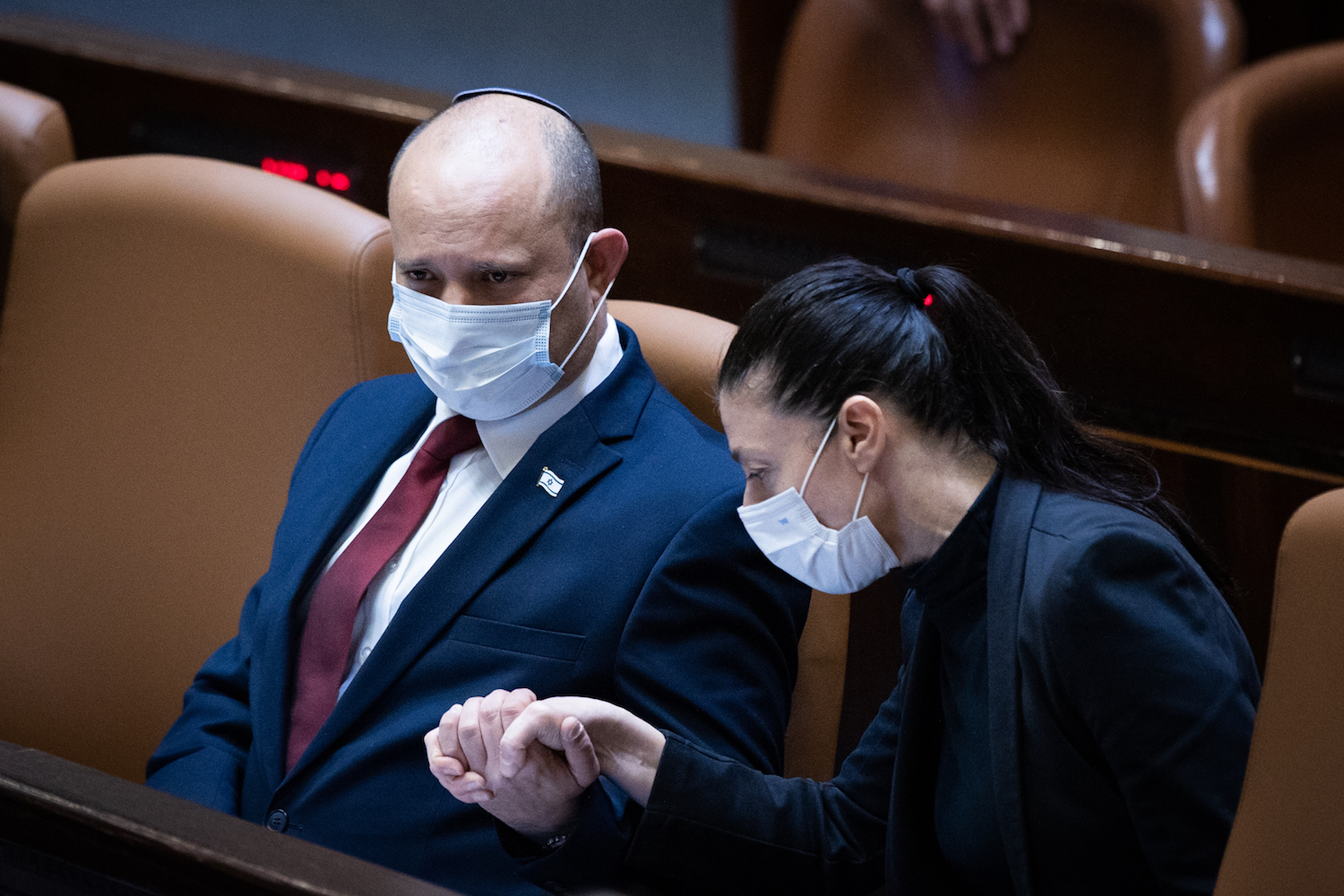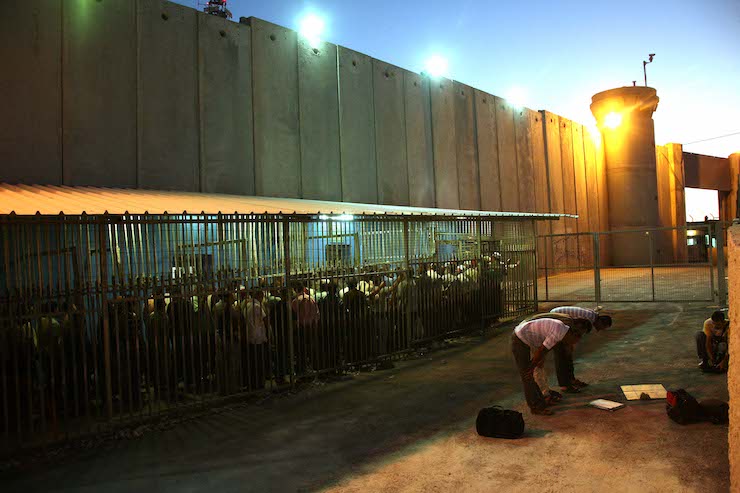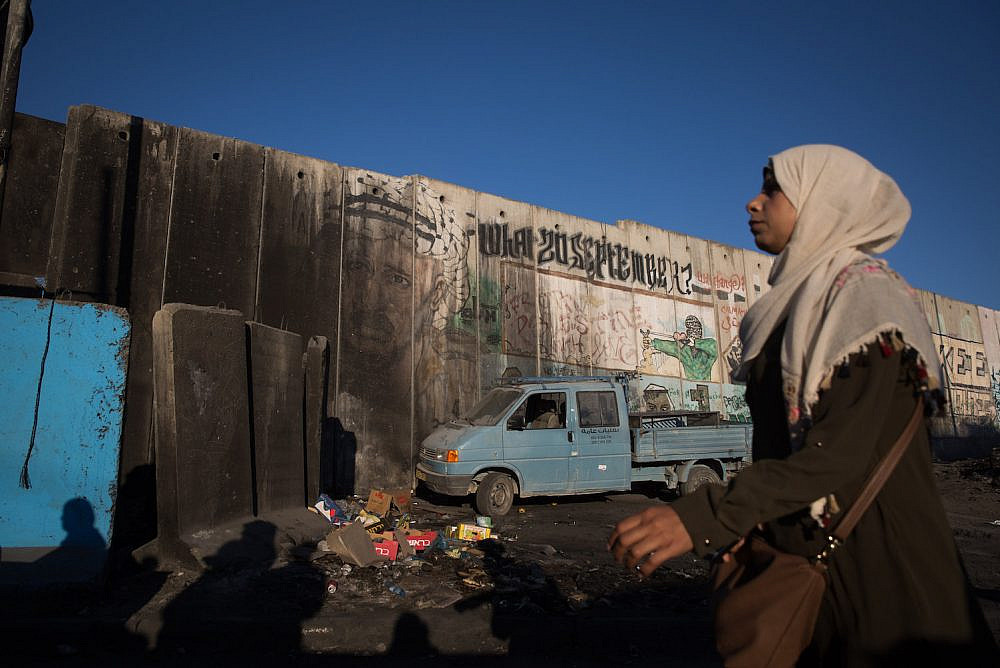At the stroke of midnight between Tuesday and Wednesday, one of Israel’s most draconian, anti-Palestinian laws will expire, enabling thousands of Palestinians in the occupied territories to apply to reunite with their spouses and families, and to begin their path to gaining Israeli citizenship.
The Citizenship and Entry into Israel Law — commonly known as the Ban on Family Unification — is an emergency order that has been extended on a yearly basis by every successive Israeli government since its implementation in 2003, during the Second Intifada. The newly sworn-in government, however, failed to extend the order with a simple majority during a raucous Knesset session that lasted well into the early hours of Monday morning. The law’s expiration will allow Palestinians who for years have been denied one of their most basic human rights to restart the process of seeking permanent residency with their loved ones in Israel.
Supporters of the bill argue that the order both strengthens Israel’s security against potential attacks by newly-naturalized Palestinian residents, while protecting its Jewish demographic majority by blocking Palestinians’ path to citizenship. Israel’s High Court itself has twice upheld the law, both times by a single vote.
The struggle and eventual failure to extend the order has been a source of embarrassment for the government in its first big test since ousting former prime minister Benjamin Netanyahu in June. Sensing an opportunity to rock the foundations of the new coalition, Netanyahu, now the opposition leader, announced his refusal to support extending the order, thus bringing the fissures cracking open the government — led by far-right Naftali Bennett, and which has cobbled together nationalist hawks, centrists, liberals, and Islamists — to a boiling point.
For days, Interior Minister and Bennett ally Ayelet Shaked of the Yamina party tried to corral members of the Islamist Ra’am and the Zionist left Meretz to support the order, particularly after the government reached an agreement with the settlers of Eviatar to temporarily evacuate the outpost (while simultaneously agreeing to lay the groundwork for legalizing their land grab in the heart of the occupied West Bank).

Meretz initially announced it would not support the Citizenship Law. On Tuesday, though, it decided to vote with the coalition after reaching a compromise whereby the law would be extended by only six months rather than a year, and would allow the few Palestinians in the occupied territories already married to Palestinian citizens to receive legal status as temporary residents.
Meanwhile, Ra’am chairman Mansour Abbas and his colleague Walid Taha both voted in favor of the compromised version of the law. Two other members of Ra’am abstained from the vote, while one member of Bennett’s Yamina party voted against the order, bringing the final vote to 59-59.
Here are four takeaways from the first major political crisis of the new Israeli government.
1. A brief moment of celebration
There is something bittersweet about the fact that the demise of one of Israel’s most discriminatory laws is primarily the result of personal resentment between Israel’s Jewish parties. Netanyahu’s Likud has never had a problem with extending the Citizenship Law before, and has even proposed a permanent Basic Law that would formally regulate immigration and constitutionalize the ban.

Yet the cracks in Bennett’s ramshackle coalition, combined with a ruthless opposition whip who is fiercely paving his path back to the Prime Minister’s Office, means that Palestinians who have been rendered invisible subjects and left to the whims of the Israeli regime could now breathe a little easier.
This new reality means that women such as Asmahan Jabali, who spoke to +972’s Samah Salaime last week, finally has a chance to become a documented resident — and potentially a citizen — of Israel. Jabali was born and raised in Israel and married a Palestinian citizen, but because her parents were from Tulkarem in the West Bank, she is registered as a resident of the occupied territories.
“Deep down, I know that the law will pass,” Jabali told Salaime. “But there’s also always a spark of hope that humanity will win out, and that someone in the Knesset will come to their senses and understand how much their voice can affect my life and the lives of thousands of women.”
Humanity clearly did not win out in this round, nor can we expect much of it from this government when it comes to the rights of Palestinians on either side of the Green Line. Still, beginning on Wednesday, Jabali and her partner will be able to re-start the process of family reunification (the law does not apply retroactively, but does allow applicants who were previously rejected to re-apply).

Palestinians may be separated from one another and subject to brutal colonial rule, but the very fact that their existence is enough to send the political establishment into a tumult is a reminder that, try as they might, Israelis will never be able to ignore the apartheid reality their leaders have built.
2. It ain’t over, yet
Now that the Citizenship Law is dead, every Palestinian reunification request will first be examined by the Shin Bet, Israel’s internal security service. Once the agency clears the Palestinian in question of “security threats,” the application can be approved.
However, the interior minister, in this case Ayelet Shaked, can personally decide to reject the applications or flood the applicants with bureaucratic hurdles in order to stem the tide of requests, which she is most likely to do. Yet Shaked has reason to worry: she knows the High Court may force her hand to accept some or many of the applications, especially after her coalition failed to extend the order.
This is precisely why it was so important for Shaked to extend the Citizenship Law in the first place. And while the law may be dead for now, Shaked and Yamina could very well try to save face by resuscitating its compromised version in the near future, or by putting forth a new bill altogether.
3. The Zionist left’s true colors
In the last elections, the liberal Meretz party ran a fervently anti-occupation campaign. Buses and billboards across Tel Aviv delivered the message that only Meretz, under the leadership of Nitzan Horowitz, will oppose the occupation and the settlement movement. The promise wasn’t entirely unfounded: the party has always nominally fought for two states and has repeatedly voted against the Citizenship Law from the back-benches of the opposition.
Suddenly, Meretz has found itself in a coalition glued together by very little beyond enmity for the former prime minister. Their initial refusal to support the law did little beyond extract a compromised version from Bennett and Shaked that would allow them to burnish their anti-occupation credentials without shattering the coalition. In other words, Meretz would have to go against everything it claims to oppose — and in doing so, signal just how little they care about Palestinians — in order to remain in power. The party’s six MKs — including two Palestinians, Ghaida Rinawie Zoabi and Issawi Freij, and Mossi Raz, a well-respected human rights advocate — all voted in favor of extending the law.
The same must be said for the center-left Labor Party. While Labor has historically supported the Citizenship Law, one would have hoped that under new Chairwoman Merav Michaeli — who has tried to rebrand the party as more feminist and humanist than its previous incarnations — things would take a different turn. And yet, like their predecessors, each of Labor’s Knesset members voted unanimously to extend the order.

Perhaps most surprising was the fact that the vote even won the support of Labor MK Ibtisam Mara’ana, a Palestinian citizen of Israel who rose to fame as a film and television director and whose work has focused heavily on the struggles of Palestinians. Ironically, she even directed an episode for the Arabic version of “Sorry for the Question” — a show on the Israeli Public Broadcasting Corporation that features people answering questions about challenging life experiences — dedicated to Palestinian families separated by the Citizenship Law.
It is no secret that long before it was an enabler of Israel’s discriminatory laws, the Zionist left was their progenitor. It is nonetheless sad to witness those who have spent their careers speaking out against or shining a light on the injustices of occupation suddenly stand in obsequiousness to the needs of a largely anti-Palestinian coalition.
4. How to win a demographic war
Depending on who you ask, the Citizenship Law was put in place as either a security measure or a means to limit the number of Palestinians in Israel. Naftali Bennett, for example, emphasized throughout the Knesset debates the need to protect Israelis against Palestinian violence.
The truth is that while the law was first introduced at a time when Palestinian armed violence against Israelis was a daily occurrence, it was easy for the state to justify it as a security measure. Yet a decade later, High Court Justice Edmond Levy, who had previously supported the law as an interim measure, called for its abolishment, pointing out the fact (raised by human rights groups petitioning against the law) that Israel already allows in tens of thousands of Palestinian workers on a daily basis, thus undermining its supposed security arguments. Even when Palestinians with Israeli permits did use violence, particularly during a spate of attacks on soldiers and civilians in 2015, Israel never stopped allowing laborers to pass through from the West Bank.

If security were indeed the primary issue, the Shin Bet’s background checks would be enough to identify those who pose an actual threat.
That leaves us with the demographic argument, which the state has never explicitly used in its legal proceedings, since the High Court would have had to strike it down as unconstitutional. And yet, if you listen to some members of Israel’s coalition, they will tell you exactly why they believe this law is necessary.
“There is no need to hide from the essence of the Citizenship Law — it is intended to ensure a Jewish majority in the State of Israel,” said Bennett’s coalition partner Yair Lapid during a meeting by his Yesh Atid party in the Knesset on Monday. That same day, former IDF Maj. Gen. and current Meretz MK Yair Golan lambasted the opposition for “betraying the Zionist dream” and trying to “drown Israeli citizens in a sea of Palestinians.”
Lapid and Golan’s brutal honesty may shock some readers, but their words reflect the demographic obsession that has been the drip feed of the Zionist project since its early years. Their remarks are a reminder that Israel is still in the throes of a colonial process with the goal of territorial and demographic domination over Palestinians. To that end, it will invoke security justifications precisely to serve its ideological goals.
This is the reason Israelis often refer to themselves as engaged in a “demographic war,” while Palestinians — by their very nature as non-Jews living under a Jewish regime, regardless of whether they are citizens — are repeatedly referred to as a “demographic bomb.” It is precisely the reason why Palestinian refugees are denied the right to return to their homeland while any Jewish person can immediately become a citizen of Israel. It is precisely why Mizrahi Jews were sent to settle depopulated Palestinian villages located along Israel’s borders in the early days of the state. Because in this country, demography and security are locked in a dance that serves one purpose: to deepen Jewish control and remind Palestinians who is in charge.


